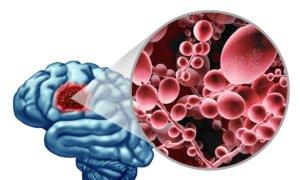“Following a concussion, there is a complex cascade of chemical events in the brain,” Mr. Antonucci said. “Neurons become depolarized, releasing excessive amounts of neurotransmitters. Damaged tissue creates free radicals, chemicals that oxidize or damage other cells.”
Concussion
Concussion can be broadly defined as a change in neurologic function resulting from a biomechanical force transmitted to the brain, usually through the skull. Loss of consciousness, confusion, disorientation, unsteadiness, dizziness, headache, and visual disturbances are all possible markers of concussion, also commonly referred to as mild traumatic brain injury.“The most recent consensus definition defines a concussion as a trauma-related brain injury with normal brain imaging or without the need for imaging,” Mr. Antonucci said.
“Even though concussions are typically considered mild brain injuries, they are unlike most other brain injuries. They can’t be seen, but they can have serious and long-lasting effects, especially if not properly managed.”
Chemical imbalances in the brain due to abrupt shifts in energy requirements as a response to a trauma quickly change the amount of blood moving to the head and the amount of blood moving around inside of the head. In some cases, cerebral blood flow changes following injury can lead to chronic headaches, changes in vision, or dizziness.
Additionally, with less oxygen, altered blood circulation, and a glucose energy deficit, response and cognitive function may become temporarily slowed. Another post-traumatic event that can occur in the brain is an increase in destructive free radical production that initiates the whole body inflammatory response.
The Chemical ‘Cascade’ of Concussion
Neurologic cascade following concussive brain injury is an immediate neuronal depolarization that causes a change in glucose metabolism, altered cerebral blood flow, and altered functional communication between neurons. The consequences of concussion include metabolic, physiologic, and structural injury to the brain.“Damaged tissues release chemicals that trigger cells to retain water and swell,” Mr. Antonucci said.
“Inflammatory molecules increase quickly and exponentially, causing wide-spread brain inflammation and symptoms, and the brain’s ability to utilize glucose is impaired, causing further damage.”
Post-Concussive Syndrome
Post-concussive syndrome (PCS) is a controversial diagnosis that summarizes the many physical, cognitive, behavioral, and emotional symptoms that can occur following a concussion. Post-concussive problems are a consequence of unexpected and abrupt fluctuations in brain chemistry, metabolism, and connections that disrupt regular neuron activity.Post-concussive syndrome is usually suspected if the adverse symptoms are new to the individual or worsened and noticed only after sustaining the brain injury. It’s also a diagnostic requirement that the new symptoms have endured for three months or longer after the brain injury occurred.
Research supports that post-concussive symptoms almost always result in some long-term consequence in cognition, learning, or memory, even if there is a temporary relief of symptoms during the initial stages of recovery.
Chronic Inflammatory Response Syndrome
Inflammation and oxidative stress in the brain can cause chronic inflammatory response syndrome (CIRS).“Inflammatory response syndrome is a condition characterized by chronic and systemic inflammation, resulting from the body’s prolonged exposure to a biotoxin or other inflammatory agent,” Mr. Antonucci said. “Possible causes include exposure to mold, Lyme disease, and other environmental factors.”
How Is CIRS Similar to Concussion?
Neuroinflammation arises from inflammatory cytokines that are meant to trigger an immune response to protect the body after an injury. If these inflammatory cytokines fail to shut down, they can end up triggering an attack on healthy cells and contribute to cellular death and inflammation of the brain tissue when left unchecked.“Inflammation can affect multiple systems in the body, including the brain,” Mr. Antonucci said. “This leads to a wide range of symptoms, including fatigue, cognitive impairment, and body pain.”
CIRS and post-concussion events can both provoke inflammation and cause an imbalance in the body’s chemistry, including an increase in inflammatory cytokines.
“The disruption in normal chemical and cellular processes can lead to symptoms affecting cognition, mood, and physical well-being in both conditions, making them feel and appear very similar,” Mr. Antonucci said.
“Describing CIRS as a ‘chemical concussion’ could be a metaphorical way to highlight the similarities in the chemical imbalances and inflammatory responses seen in both conditions.”
While a concussion results from physical trauma, CIRS is usually caused by prolonged exposure to a biotoxin or another trigger of inflammation.
Minimizing Inflammation
What should we look out for? Fatigue, headaches, dizziness, and cognitive impairment may be signs of oxidative stress triggering a mild inflammatory response. If the cause isn’t resolved, these symptoms may grow worse as the inflammation takes a larger toll on the body.Mr. Antonucci said the key to treating CIRS comes down to identifying and removing the biotoxin or other inflammatory trigger.
“Patients may also be treated with medications to manage symptoms, and interventions to support detoxification and reduce inflammation in the body,” he said.
He said that treatment for any type of brain inflammation case is “multidisciplinary, involving medical management, lifestyle changes, dietary modifications, nutrient supplementation, and supportive therapies to address the wide range of symptoms and improve quality of life.”







